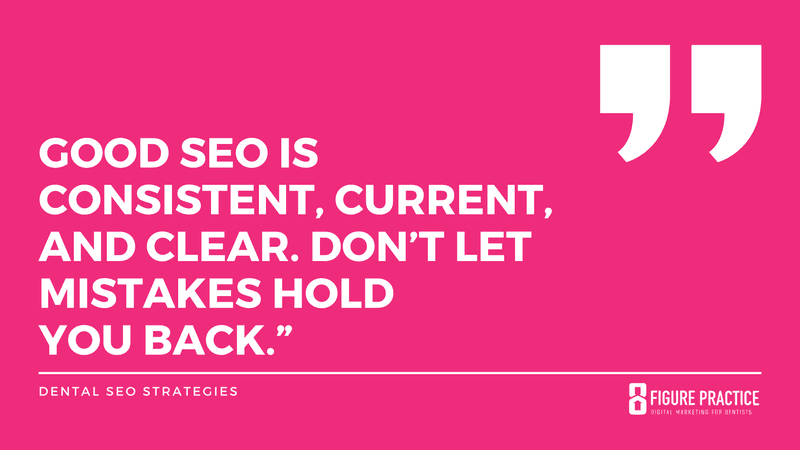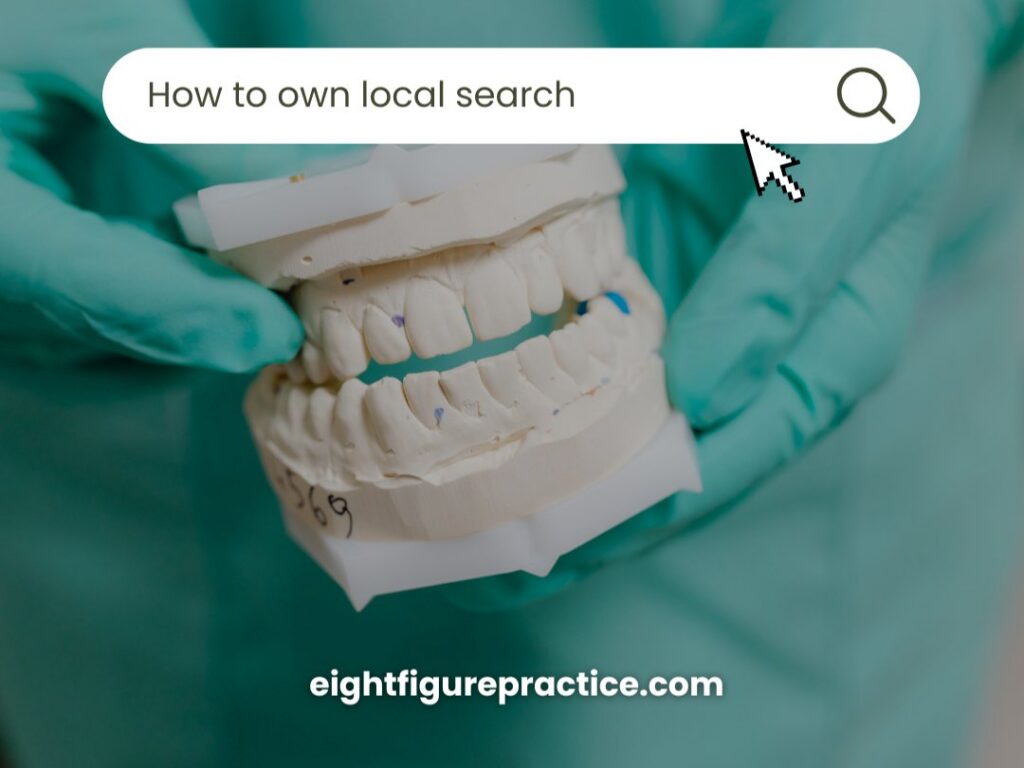
If you’re a growth-focused dentist, SEO might feel like something to deal with later. Don’t delay. Local SEO is how high-value patients find you nearby. Whether you're aiming to stay independent, scale quickly, or sell for top dollar, claiming your spot in local search is crucial. Here are the dental SEO strategies that matter most in 2025.
Key Takeaways:
- Update your Google Business Profile (GBP) with complete info, real photos, and weekly posts
- Keep your NAP (Name, Address, Phone) consistent across all listings
- Request and reply to Google reviews—they boost patient trust and Map Pack rankings
- Use tools like Soovle, Google Trends, and Keyword Planner to find high-intent local searches
- Create specific service pages with clear headers and local keywords
- Add alt text to images, compress media, use HTTPS, structured data, and upload an XML sitemap
- Build backlinks through local collaborations, directories, and also guest blogs
- Share content patients care about—blogs, FAQs, city pages, and videos
- Monitor performance with Google Analytics and Search Console—focus on actions, not page views
- Avoid slow mobile sites, old info, or duplicate pages—refresh often to stay relevant

Dental SEO Strategies That Attract Patients And Grow Practices
Growing a dental practice today requires more than excellent care—it requires visibility. Because most patients search online before choosing a dentist, search engine optimization (SEO) plays a central role in practice growth. However, not all SEO efforts bring results. To succeed, dentists need a structured system that combines local visibility, keyword targeting, on-page improvements, backlinks, and consistent reputation management. When these pieces come together, dental practices attract more patients, improve authority, and strengthen long-term value. That’s why understanding and using effective dental SEO strategies is essential for every growth-minded dentist.
Dental SEO Strategies Start With Local Search Optimization
If your goal is to bring in more patients from your community, local SEO must come first. Local SEO ensures that when someone searches “dentist near me” or “emergency dentist in [city],” your practice shows up. Because patients rarely look beyond the first page of search results, ranking high locally makes all the difference. Three areas deserve attention: your Google Business Profile (GBP), your Name-Address-Phone (NAP) consistency, and your patient reviews.
Optimizing Your Google Business Profile Is Critical
Your Google Business Profile acts like a digital storefront. To optimize it, first claim your profile and complete every section thoroughly—services, hours, payment methods, and categories. Photos of your office inside and out, your staff, and even before-and-after results help visitors trust what they see. Choosing accurate categories also matters; for example, if orthodontics is your focus, select “Orthodontist” rather than “General Dentist.” Adding descriptive phrases like “Trusted family dentist in Plano, TX” inside your description improves relevance for local searches. Weekly updates using Google Posts keep your listing active and visible, while service listings such as implants, cleanings, or Invisalign ensure patients can find you directly.
NAP Consistency Strengthens Google’s Trust
Google rewards reliable business information. If your practice name, address, or phone number differs across directories like Yelp, Healthgrades, or Facebook, Google may question your credibility. Even small mismatches like “Suite” vs. “Ste” can lower rankings. By auditing all listings and using tools like Yext, you can ensure consistency. Because trust is at the heart of search algorithms, matching NAP details across the web boosts both visibility and patient confidence.
Patient Reviews Power Local Rankings
Reviews are one of the strongest signals for local SEO. A steady stream of positive reviews tells both Google and potential patients that your practice is reliable. Asking satisfied patients to leave reviews right after their visit—through text or email links—can build momentum. Negative reviews inevitably appear, but responding quickly and professionally demonstrates care and earns respect. In fact, Google considers interaction with reviews a trust factor. Therefore, consistent review management is a cornerstone of dental SEO strategies.
Dental SEO Strategies Depend On Strong Keyword Research
Keywords are the foundation of any SEO campaign. Because patients type specific phrases into Google when looking for care, choosing the right keywords ensures your practice connects with those ready to book.
Local Patients Search With Intent
Most patients search using a combination of service, need, and location. Examples include “braces near me,” “emergency dentist in Plano,” or “kids dentist in Austin.” These long-tail keywords reflect intent to act. Since detailed searches often lead directly to calls or bookings, targeting them is essential. Tools like Google Keyword Planner, Soovle, and Google Trends help uncover what local patients are typing. Reviewing autocomplete suggestions in Google Search also reveals valuable terms.
Service-Specific Keywords Drive Relevance
Each dental service deserves its own targeted phrase. For instance, “teeth cleaning in Frisco,” “clear braces in Tyler,” or “pediatric dentist open Saturday” can each be used on dedicated service pages. By pairing services with city-specific terms, practices capture local demand. Updating keywords monthly helps maintain a competitive edge, since search behavior evolves.
Dental SEO Strategies Rely On Effective On-Page Optimization
On-page SEO is how your website communicates with search engines. Because most patients will land on your site before booking, optimizing structure, content, and technical details ensures visibility and conversions.
Title Tags And Headers Guide Search Engines
Your page titles should include primary keywords and locations, such as “Family Dentist in Dallas, TX.” Each page should feature one H1 heading and supporting H2 or H3 subheadings. Service pages should use titles like “Dental Crowns in Carrollton” to match local searches. Meta descriptions should be under 160 characters and include a call-to-action such as “Call today for an appointment.”
Service Pages Should Stand Alone
Instead of listing all treatments on a single services page, create individual pages for cleanings, crowns, Invisalign, or implants. By focusing each page on one service, search engines and patients understand content more clearly. Internal links between pages and location pages strengthen site structure.
Images And Mobile Usability Are Essential
Photos need alt text describing the image with local terms, such as “Plano dental exam room.” Because most dental searches happen on mobile, your site must load quickly and be easy to navigate. Compress large files, simplify menus, and ensure buttons are large enough for mobile use. Fast-loading, mobile-friendly sites rank higher and keep patients engaged.
Dental SEO Strategies Benefit From Backlinks That Build Authority
Backlinks tell Google that your site is trustworthy. But not all links are equal—quality matters more than quantity.
Local And Industry Links Add Value
Start with community connections. Sponsoring a local sports team or hosting school events can earn links from trusted local websites. Guest posting on health blogs or dental associations also builds authority. Listing your practice on respected directories like the ADA, Zocdoc, or Healthgrades provides high-quality backlinks while also reaching real patients.
High-Quality Links Share Key Traits
The best links come from health-related sites with strong traffic, include your practice name near the link, and provide real value. Even community groups on Facebook that link to your site can help. Avoid purchasing links, as Google can detect manipulation and penalize rankings.
Dental SEO Strategies Use Content To Convert Visitors
Content marketing builds trust and answers patient questions before they call. By creating blog posts, FAQs, and city-specific landing pages, dental practices build authority and attract more patients.
Blogs And FAQs Address Real Concerns
Patients often search for answers such as “Why does my tooth hurt after a filling?” or “Can I get whitening with braces?” Writing posts that answer these in plain language builds trust. FAQs are particularly useful for capturing voice search queries.
Location Pages Strengthen Local SEO
Each office location deserves its own landing page with city names in titles and URLs. Adding maps, contact details, staff photos, and local community involvement builds local relevance. For example, a page titled “Cosmetic Dentistry in Fort Worth” provides both patients and Google with clear signals.
Video And Photo Content Build Trust
Because many visitors prefer visuals, videos and photos showcase real care. Simple testimonial videos or a tour of your office can build immediate credibility. Every photo should include descriptive file names and alt text, improving visibility in local search.
Dental SEO Strategies Require Reputation Management
Reviews are not just about patient perception—they are also an SEO ranking factor.
Google Reviews Improve Search Visibility
Google favors profiles with recent, frequent, and positive reviews. Asking every patient for feedback and responding to all reviews builds relevance. Tools like Podium, RevenueWell, or Birdeye streamline the process and notify you of new reviews.
Reputation Directly Impacts Google Maps Rankings
The “Map Pack” that appears at the top of search results depends heavily on reviews, keywords, and proximity. Encouraging patients to mention services like “teeth whitening” in their reviews strengthens these signals. Consistent NAP details across platforms also reinforce your credibility.
Dental SEO Strategies Improve Through Technical Enhancements
Technical SEO ensures your site runs smoothly and is easy for search engines to crawl.
Speed, Security, And Structure Matter
Slow sites lose patients. Compressing files, fixing broken links, and testing with Google PageSpeed Insights ensures performance. Installing HTTPS with SSL certificates improves both ranking and patient trust. Adding schema markup such as LocalBusiness schema helps Google display hours, reviews, and contact information in search results. Submitting XML sitemaps through Google Search Console ensures all pages are indexed.
Dental SEO Strategies Must Be Measured And Monitored
Tracking progress ensures efforts produce results. Google Analytics reveals traffic sources, while Google Search Console shows which keywords drive clicks. Watching metrics like bounce rate, time on site, and conversions highlights where to improve. Tools like SEMrush or Moz provide keyword tracking and competitor insights. By reviewing data monthly, practices can adapt strategies and maintain consistent growth.
Dental SEO Strategies Can Be DIY Or Professional
Dentists may wonder whether to handle SEO themselves or hire professionals. Doing it yourself works if you have time to learn, but agencies often deliver faster results. Professional teams understand technical fixes, tracking, and content creation. However, dentists should choose agencies with dental expertise, clear reporting, and ownership rights for content. For those starting on their own, claiming a Google Business Profile, requesting reviews, and using free keyword tools provide a strong foundation.
Dental SEO Strategies Avoid Common Mistakes
Certain mistakes can undo progress. Slow-lohttps://eightfigurepractice.com/#lets-growading sites, poor mobile design, and duplicate content reduce rankings. Outdated information on your site or local listings confuses patients and search engines. Inconsistent NAP details also weaken credibility. By keeping information current, using original content, and ensuring accuracy across all platforms, practices avoid unnecessary ranking drops.
Take The Next Step Toward Smarter Growth
Strong SEO is not about guesswork—it’s about using proven systems that attract the right patients consistently. By focusing on local optimization, content, backlinks, and technical improvements, you can build a practice that grows with predictability and control. If you are ready to implement structured dental SEO strategies that deliver real results, explore Eight Figure Practice. Their expertise helps practices scale faster, earn more, and stay in control. Connect today to begin your path toward growth that lasts.



